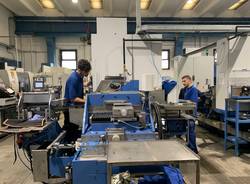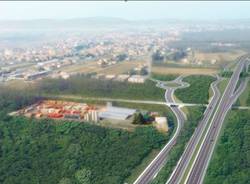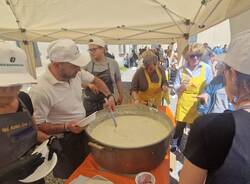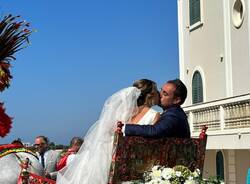Mazzini, Garibaldi, Cavour: our noble, but forgotten fathers
The congress, at which Mario Cervi is one of the speakers, concludes the 3 days of celebrations for the 150th anniversary of the unification of Italy. “The unification was a miracle, a unique moment: why throw it away?”
History, not for the elite circles, but with and for the people who, day by day, write it. Abraham Lincoln would have so liked the interpretation given by the municipal administration of Solbiate Olona at the opening of the congress dedicated to three of the founding fathers: Camillo Benso, the Count of Cavour, the extremely capable minister from Piedmont who, by creating the right political conditions, made national unification possible; Giuseppe Garibaldi, the Hero of the Two Worlds, an all-round character; and Giuseppe Mazzini, the inspirational Genoese republican, a man of generous ideals and suppressed revolutions, a great “loser” of the Risorgimento’s struggles, who has always been a point of reference for thinkers and patriots alike.
In the auditorium in Solbiate, before an audience in which there was no shortage of civil and military authorities, not to mention students, with two second year, middle school classes, and the “youth mayor”, 14-year-old Simone Colombo, on stage with the Army Major Vincenzo Ciaraffa chairing, the speakers included Mario Cervi, renowned journalist and writer, Professor Vittorio Emanuele Parsi, lecturer at Milan’s Catholic University, Professor Giuseppe Armocida, of Varese’s Insubria University, Luigi Barion, the chairman of “Varese per l’Italia”, Varese’s committee for the 150th anniversary celebrations, the Prefect Simonetta Vaccari, and General Gianmarco Chiarini, commander of the NATO Rapid Deployable Corps, Italy (NRDC-It), based in the Mara barracks in Solbiate Olona. Thus, historical, military and institutional aspects were brought to close the three day event, during which Solbiate was adorned with the Italian flag.
One episode, recounted by Major Ciaraffa, seemed to have been taken directly from Edmondo De Amicis’ novel “Heart”: two non-European citizens wanted to buy the Italian flag from the shops that exhibited it. “Why are you interested in it? You’re foreigners,” someone asked.
“No, we’re in Italy. and we want to be Italian.”
After a gentle version of Italy’s National Anthem, sung by a splendid female voice, Prefect Vaccari presented Mayor Melis with the commemorative medal chosen by the President of the Republic, Giorgio Napolitano. The Mayor, Luigi Melis, confirmed his wish to create a centre for Italian studies, that should bring renowned academics together, at least once a year; Mrs Vaccari read a text from President Napolitano, which called upon everyone to do away with hang-ups, to overcome “the horrible excesses of rhetoric” that “make us reluctant to speak about heroes”. “There’s a great need to feel united, to draw energy and trust from the past, especially in times of crisis,” Mrs Vaccari said, as she described the role that prefects had played, since 1865, in bringing the central power to the local level, a role that was essential in the unification of a country divided by enormous differences, above all in terms of language.
“Risorgimento” means many things; for example, the birth of an army, that may have existed before the official date of 4 May 1861, when the note of Minister Manfredo Fanti established it, thereby creating what was immediately “an extended army of the House of Savoy”, in which people from Piedmont represented less than 10% of the soldiers, but 50% of the officers. It was this army that ferociously suppressed the bandits in the South, and made a poor impression during the Third War of Independence, in Custoza, which brought together the “institutional forces” loyal to the Savoy crown with the “pragmatists”, who had come from the field and, like Fanti, also from foreign battles. The maximum praise from General Chiarini went to “non-general” Garibaldi, who was never accepted among the official ranks. “He was a great commander in the field” he said, as he analysed how even a “regular” battle, like the one of Volturno, was intelligently handled, with modern ideas, like using the railway to move the reserves behind Capua to ward off the Bourbon assault. It was a winning move.
Mario Cervi said of Cavour that he was not exactly a nice guy. But Major Ciaraffa maliciously asked, “Would a nice guy have managed to unite Italy?”
“A nasty question, when Italy is in the hands of a nice guy,” replied Cervi, drawing a distinction between the politician and the statesman who knows how to put the interests of the country above those of the faction, or even his own. And Cavour, “more of a genius than Tremonti, and as unpleasant as him”, was a statesman like Mazzini, even though he was branded “a dreamer and a jinx” by the detractors of the day, or even by the Garibaldi. “They were all inspired by great ideals, not by partisan, or ‘between the sheets’ politics.” The unification was “an incredible, unique moment, a miracle”, why throw it away? Today, we know what the Northern League want to do with the Italian flag; in the south of Italy, “pro-Bourbon revisionism” is advancing, with claims that before the fall of the Savoys, the south of Italy was civilised and happy. This hypothesis will certainly appease the whining of the South’s supporters, but it is historically indefensible. So Cervi is “disappointed and embittered” to see the authors of Italian unification mistreated a century and a half later. His conclusion is ruthless: “The country is the creation of that Prince of Savoy, who, had he ended a war on the same side that he had started it, would have had changed alliances twice.”
The reflection by Professor Parsi was full of interesting points concerning the difficult relationship between unification and the Catholics, that is, between the ruling classes of the unified Italy and the Vatican hierarchy surrounding Pope Pius IX. (This Pope was blessed in 2000, “but he still guillotined the Liberals”.) The reading by Professor Parsi described the background to the breaks, the historical continuities and the lukewarm support of unification, not from the poor, who had other things to think about, but mainly from the middle classes, students and intellectuals. Professor Parsi sadly acknowledged that, “Those who support the Italian unification today, support Garibaldi, Cavour or Mazzini less than they do the Southern Italy Development Fund, or Mike Bongiorno.” Little Italy prevails over the North of Italy, advantages and customs, over history, “the fear of not being able to make it alone”, over the desire to stay together. But who supports unity? The armed forces, says Parsi. But despondency is spreading throughout the country, with disdain for everything that smacks of intellectualism, as demonstrated, on the one hand, by the misunderstanding of Mazzini (who was even called a terrorist, because of his emphasis on revolutionary action and tyrannicide, which was then taken up by the Italian resistance movement), and on the other, the essentially bipartisan neglect of schools and universities. The rejection of meritocracy, “the inability to close the books on the past and look to the future”, the failure to acknowledge abilities. This is why, when a soldier on a mission died, it was said, “He couldn’t have done otherwise, he was a soldier”. So, “no more reductions, let’s set a limit: so much, and no more. Any more is your fault, not mine.”
Professor Armocida dedicated his speech to women. “The real unification was the one in the spring of 1946. For the first time, women could vote and participate fully in the life of the country. It’s no accident that we have a woman Prefect today. What kind of Resurgence would we have had without mothers like Adelaide Cairoli or the Roman women who, in 1849, treated the wounded, but who also picked up arms?”
Likewise, what kind of Republic we would have had without female partisans? “Be careful, because today there is an assault on this kind of Republic and on the 1948 Constitution, we must defend unity, which is at risk.” As good citizen of Varese, Barion remembered that it was in Varese that the first “true” Italian flag (the Napoleonic flag of Reggio Emilia “was of the Cisalpine Republic, which was quite different) was put up, in 1859, in Biumo during the days of the Battle of San Fermo when Garibaldi led the fight from the outlook on the top of the observatory hill where the Ville Ponti now stand. What do the young people of today know about that? Nothing. In answer to the question about who the hunters of the Alps were, “the girls from one of the most prestigious high schools in town said, ‘Sure, the English who used come her to hunt in the mountains…’”
Finally, Major Ciaraffa recounted again some of Garibaldi’s adventures with women (the wedding with Marquis Castiglioni’s daughter, which ended as the newly-wed couple exited the church, when he discovered that she was already pregnant …), wondering if these made him more popular. Barion answered ironically: “if that were the case, Berlusconi would be immortal.” And on Carlo Cattaneo, who is so dear to the Northern League: “If Cattaneo were here now, would he speak about Italian, or European federalism? We must think of a continental plan,” is the invitation of Barion, “of being able to dream like the young people of the Risorgimento, keeping our hand firmly on the Constitution.”
La community di VareseNews
Loro ne fanno già parte
Ultimi commenti
lenny54 su I no vax sono tornati a colpire in provincia: imbrattati i muri della redazione di Varesenews
malauros su I no vax sono tornati a colpire in provincia: imbrattati i muri della redazione di Varesenews
Felice su I no vax sono tornati a colpire in provincia: imbrattati i muri della redazione di Varesenews
PaoloFilterfree su A Varese Salvini prova a ricucire passato e futuro della Lega, ma Bossi non c'è
axelzzz85 su A Varese Salvini prova a ricucire passato e futuro della Lega, ma Bossi non c'è
elenera su A Varese Salvini prova a ricucire passato e futuro della Lega, ma Bossi non c'è














Accedi o registrati per commentare questo articolo.
L'email è richiesta ma non verrà mostrata ai visitatori. Il contenuto di questo commento esprime il pensiero dell'autore e non rappresenta la linea editoriale di VareseNews.it, che rimane autonoma e indipendente. I messaggi inclusi nei commenti non sono testi giornalistici, ma post inviati dai singoli lettori che possono essere automaticamente pubblicati senza filtro preventivo. I commenti che includano uno o più link a siti esterni verranno rimossi in automatico dal sistema.